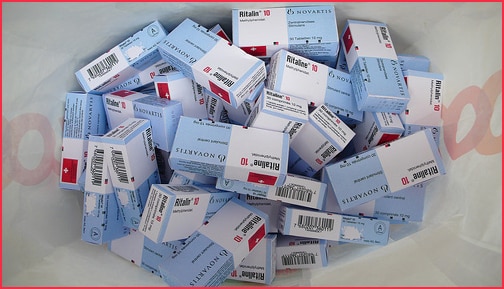
In America, among kids ages four to 17, about 8% are diagnosed with Attention Deficit Hyperactivity Disorder (ADHD.) They have a hard time sitting still, following a train of thought, being regimented, staying quiet, and settling down. And even though stimulants are supposed to stir a person up, when stimulants are taken by the kids with ADHD, these drugs help achieve a focused state of calm. This “paradoxical effect” has been taken for granted for decades.
Let’s Move! and most of the other anti-obesity programs tell us that kids don’t get enough exercise, and that their lifestyle is too sedentary, with TV, computer games, etc. Meanwhile, a very large proportion of American children are given drugs whose whole purpose is to render those kids more sedentary. Does anybody see the contradiction here?
“How Do Prescription Stimulants Affect the Brain?” The National Institute on Drug Abuse answers that question: All stimulants work by increasing dopamine levels in the brain. In people whose dopamine signals are weak, a drug like methylphenidate (Ritalin) amps up the release of dopamine.
Stimulants often have side effects, such as weight loss, insomnia, and irritability. About one child in three is overweight or obese. And nearly one in 10 has ADHD. There is bound to be a certain amount of overlap: overweight or obese kids who are treated with stimulants for ADHD. So the “weight-loss part” sounds good, right?
But what about the “insomnia” part? We have been told by researcher Janice F. Bell, of the University of Washington, that, for preschoolers, the amount of sleep they get is crucial, because if it’s not enough, there’s a danger that they will become obese. Daytime naps don’t count, it has to be a solid amount of uninterrupted sleep, at night.
So there is a hard question, whether to dose a five-year-old with a pharmaceutical which, while it may help him behave in school, might cost him sleep and set him on the road to childhood obesity. That’s a definite conflict of interest. One is tempted to think, “But how often does it happen?” Pretty often, actually, and it’s been going on for some time. Andrew M. Weiss writes,
In the winter of 2000, the Journal of the American Medical Association published the results of a study indicating that 200,000 two- to four-year-olds had been prescribed Ritalin for an ‘attention disorder’ from 1991 to 1995.
Kids as young as two! The long-term versus short-term effects are an issue for more than one reason. A small amount of research has returned ominous results that might be a false alarm, or might be well worth looking into. In Scientific American, Edmund S. Higgins put it like this:
A smattering of recent studies… hint that stimulants could alter the structure and function of the brain in ways that may depress mood, boost anxiety and, in sharp contrast to their short-term effects, lead to cognitive deficits.
First of all, cognitive deficit is the inability to think, and there is enough of that going around already. But look at the part that says “depress mood, boost anxiety.” Why do kids overeat, and develop a dangerous dependence on food, and sometimes even reach a state of addiction to it? As they will state freely via the Weigh2Rock website, they overeat as a reaction to depression, anxiety, and every other imaginable kind of stress.
So here is the question, re: stimulants. Do we want to be giving young children pills that actually change their brains, and the way their brains work, in such a way that they will grow into tweens and teenagers who are plagued by depression and anxiety, which is a certain recipe for eating disorders, up to and including morbid obesity?
Which value is more important and desirable? Obedient, amenable behavior in school now, or a possible lifetime of obesity and the attendant medical problems? The school, the parents, and last but not least, the child, all have different interests. It is a very serious conflict of interest, for sure.
Your responses and feedback are welcome!
Source: “NIDA InfoFacts: Stimulant ADHD Medications — Methylphenidate and Amphetamines,” NIDA
Source: “Sleep Linked to Childhood Obesity,” WebMD, 09/07/10
Source: “The Wholesale Sedation of America’s Youth,” CSICOP.org, 12/08
Source: “Do ADHD Drugs Take a Toll on the Brain?,” Scientific American, 07/22/09
Image by unfolded, used under its Creative Commons license.

 FAQs and Media Requests:
FAQs and Media Requests: 











